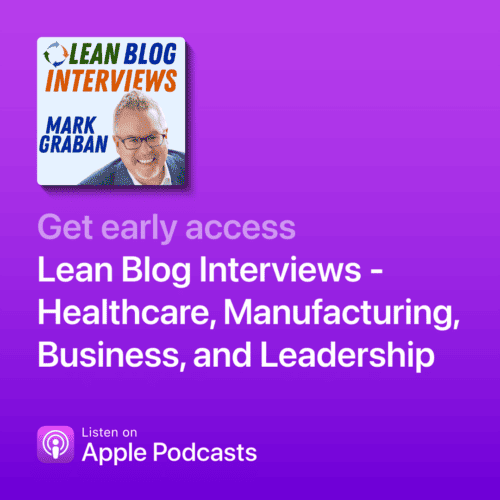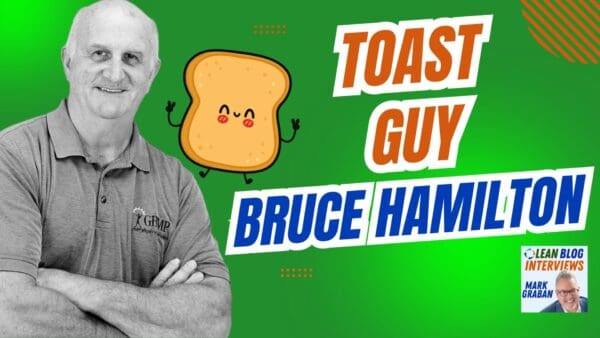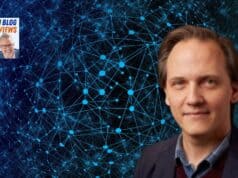Scroll down for how to subscribe, transcript, and more
My guest for this bonus episode of the Lean Blog Interviews Podcast is Bruce Hamilton, who is joining me on the show for the first time. Bruce is a renowned figure in the Lean world, serving as the President of GBMP Consulting Group and Director Emeritus for the Shingo Institute.
As a senior examiner and certified workshop facilitator for the Shingo Prize, Bruce brings a wealth of knowledge and experience. He is also a past recipient of the Shingo Prize in both business and academic categories and has been inducted into both the Shingo Academy and the AME Manufacturing Hall of Fame.
During our conversation, Bruce reflects on two major milestones: the 25th anniversary of the now-classic “Toast Kaizen” video and the 20th year of GBMP's Northeast Lean Conference. He shares the humble beginnings of “Toast Kaizen,” filmed in his kitchen with the help of his two-month-old son, and its unexpected success. We also discuss the evolution of the Northeast Lean Conference, from its modest start to an event that now attracts Lean thinkers from across the country. Bruce talks about the upcoming conference theme, “Leveraging Lean to Thrive,” and how Lean principles can help organizations overcome uncertainty, especially in today's challenging times.
The podcast is brought to you by Stiles Associates, the premier executive search firm specializing in the placement of Lean Transformation executives. With a track record of success spanning over 30 years, it's been the trusted partner for the manufacturing, private equity, and healthcare sectors. Learn more.
This podcast is part of the #LeanCommunicators network.


Full Video of the Episode:
Thanks for listening or watching!
This podcast is part of the Lean Communicators network — check it out!

Automated Transcript (Not Guaranteed to be Defect Free)
Mark Graban:
Hi, welcome to Lean Blog Interviews. I'm your host, Mark Graban. I'm really excited to be joined today by Bruce Hamilton. It's his first time joining us. He is the President of GBMP Consulting Group. He's also Director Emeritus for the Shingo Institute, which is the home of the Shingo Prize. He's a Senior Examiner for the Shingo Prize and a certified Shingo Institute workshops facilitator. He is also a past recipient of the Shingo Prize in both the business and academic categories, and he's an inductee to the Shingo Academy. He was also inducted in 2015 into the AME Manufacturing Hall of Fame. So, before I tell you a little bit more, Bruce, thank you for being here.
Bruce Hamilton:
How are you, Mark? Thanks for having me. I worry when I hear those accolades, it kind of sounds like the thing they do just before somebody passes. Lifetime achievement, this and that. If you hang around long enough, these things happen. So, it's a pleasure to be with you. And, you know, this is the 25th anniversary of Toast Kaizen. I don't know if you knew that.
Mark Graban:
Yes.
Bruce Hamilton:
We released it in 2004, and it was well received, which is great. But I actually made that video in my kitchen with my son, who at the time was two months old. He's now a videographer, so he probably could do a new version if I ever wanted to. I've decided not to, though. People ask me why, and I think, why would I want to? But anyway, it's also the 20th anniversary of GBMP's Northeast Lean Conference, which actually began as a Northeast Shingo Conference. At one point, Shingo had an interest in having a regional prize. So, full disclosure, it's not actually the 20th year. It's the 20th year we've had a conference. The first year, I think we had 65 people, and I think 64 of them were from one company. Things have changed. They've grown, happily. We anticipate maybe 400 people this year. We're pushing for that a little right now. Last year, we had people from 23 states. Actually, we call it the Northeast Lean Conference, but people move away and then come back. I got a text this morning from somebody who was a customer here in Massachusetts, and then he moved out of state, and he let me know that he was coming. And I was thinking about this, Mark. That's probably my favorite part of conferences. Not that I mind the keynotes, because there's always good information. You know, I'm not much of a socializer, with the exception of maybe our Lean After Dark event, the karaoke type stuff where you can make a fool of yourself, but actually meeting practitioners, people who have been customers or former employees or bosses, and sharing. That's something that can happen at a conference, which is hard to do in other ways. So, I'm looking forward to that. I'm looking forward to seeing my friend who I haven't seen in nine years, and I'm hoping to make a few more friends at the conference.
Mark Graban:
Which friend is that? Which friend haven't you seen in nine years?
Bruce Hamilton:
I don't know if I should mention his name, but I will. Howard Wu is his name.
Mark Graban:
Okay. Hey, Howard.
Bruce Hamilton:
I know Howard as somebody who was an incredible leader, not a leader from a management standpoint, but he managed up and got a lot of people involved in a very admirable way. So, I'm really excited to see him.
Mark Graban:
Well, good. Well, how dare you mention somebody in such a positive manner?
Bruce Hamilton:
Well, this is true. This is true. I'll be looking forward to seeing other people as well, sure.
Mark Graban:
The 20th annual Northeast Lean Conference, Leveraging Lean to Thrive, is happening November 7th and 8th. There'll be a link in the show notes, and we'll talk more about the conference. But yeah, I'll tell you, Toast Kaizen was probably around 2007. I want to say I had a client in healthcare who had bought, at my recommendation, they had bought the Toast Kaizen video, and they had watched it and rewatched it a lot. Great video. And then I think I was at one of the Northeast, and I'm sure it was the Northeast Shingo Conference at the time. And I got a picture with you, and they were so excited. I remember one nurse, she was so excited, she said, “You met the toast guy!” She couldn't believe it, you were a celebrity to her.
Bruce Hamilton:
It's crazy that still happens, you know, after all this time. There definitely is a generation coming along who have no clue about that, and that's fine too. But people treat me like a movie star, and you know, look, the video is famous. That's what's famous. I just happen to be the guy in it. But of course, I'm always happy to take some pictures. And yeah, for the 25th anniversary of Toast Kaizen, we have a few surprises involved at the conference. Maybe we'll have some people come and make a slice of toast. I don't think I've ever autographed a slice of toast.
Mark Graban:
I was going to ask you that. Do people try to bring you toast after breakfast?
Bruce Hamilton:
Hey, Bruce, that has happened.
Mark Graban:
How many slices? Do they try to act out the whole thing in front of you?
Bruce Hamilton:
You know, I've probably heard the same jokes over and over again. I'm flattered. It was, you know, it was made really out of desperation when I was in industry. It was something I did to get my managers to get out of their offices and go observe. And it just happened to hit a mark. So, very happy about that.
Mark Graban:
And unlike a lot of great films, you didn't rush to cash in on a sequel that didn't quite live up, like Toast Kaizen 7 or something. I'll give you credit for holding to your artistic vision.
Bruce Hamilton:
I just have to say, Mark, we were honored when the Shingo Institute recognized the video. But one question that I got, and I won't say from whom, was, “Why didn't you find a more attractive actor to do the video?” I was an old guy even then, and they were looking for a movie star, I guess. So, yeah, it's hard to believe this many years have gone by, and the theme of the conference is, you know, we've all kind of been through a recent calamity with COVID, and those kinds of things are fresh in our minds. There's still shortages of parts, and people are hard to get. But the reality is, I was thinking, there's never been a time in my life where there wasn't a whole lot of uncertainty. It's kind of just the way things are. I still remember as a little kid, climbing under a desk, hoping that we would not receive a nuclear attack. I'm old enough to remember that. And I lived through the Vietnam War and protests of the war, and racial protests and assassinations. Some horrible times. And, of course, the Twin Towers. That's in this century. All of these things, this kind of stuff's happening all the time. So, it's not so much like we've suddenly reached some period where things are uncertain. Reality is, these are things that we need to count on. And oftentimes, even when I'm working with a client, we're trying to implement a new idea. I say, “Assume it's not going to work. It's going to be a problem right off the bat because there are things you haven't considered.” So, we're going to try to touch on that type of theme–the impact that real scientific thinking and systemic thinking can have on, let's say, long-term preparation, not just the event we have today, but what do we need to do in order to sustain ourselves in the long term? That has a lot of implications with a whole generational change and all that sort of thing.
Mark Graban:
So, the theme Leveraging Lean to Thrive to me speaks to the idea we shouldn't be implementing Lean, or whatever phrase you use, just to use Lean tools. It's really about how do we thrive as a business? Delighting customers, creating a great environment and security for the employees. Those are a couple of ways. I think thriving is really enabled by Lean.
Bruce Hamilton:
All of those. And I think back to this recent mess we had with COVID. There were organizations that already had a basis where their employees were engaged, and there was trust. And those companies actually took this as a challenge. Unfortunately, there were too few of those. Others found reasons to back off and do nothing. But for the companies that had created that culture–and when I say culture, I don't just mean the environment that you work in. You actually have to know what improvement means. You have to actually have the skills to be a problem solver. When those things are in place, challenges like COVID, awful as they are, are challenges. They're not just disasters. We're not hiding. We're going to
find a way to deal with them. So, we felt that this is a good theme for all times, not just for the current day.
Mark Graban:
Yeah, well, looking at the list of keynote speakers, some of the best Lean thinkers and doers, not just in the Northeast, but I would say anywhere, a couple of our former podcast guests and friends of mine, Steve Spear, Karl Wadensten. So, it's going to be a great lineup for the speakers. And then, like you say, Bruce, I love hearing really engaging speakers like them. But the networking opportunities and the hallway conversations and the discussions over breakfast–whether toast is involved or not–those are some of the other things that bring a lot of value.
Bruce Hamilton:
Yeah, I just have to mention, all the speakers are great. And Karl has been a friend for a long time. And I tell Steve, “I knew you when you were a kid.” He's a great friend, has been a friend for a long time. But there's one speaker who agreed to speak, and this is Andrea Haas, who is the President of Summit Polymers. This is the site where typically Toyota TSSC takes their project companies to learn what TPS really is. But my connection with Andrea is when I was working as a project company for Toyota. They sent in a young 22-year-old, 20-something industrial engineer to help me work on a project for setup. My first reaction was, “Oh, a 22-year-old kid, what's she going to know about setting up a CNC lathe?” Well, of course, I was wrong. Embarrassingly wrong. It wasn't that she knew anything specifically about setup, but she knew what TPS was, and she kind of dragged me through a keyhole. And that's going back now to, like, 1998. So, it's that long ago. And so, I made this request, and I was just delighted that she's now President of a large corporation. It's not like she has a lot of free time. I'm really excited to have her share, of course, as well as all the other speakers. Steve has a great new book, and I'm looking forward to hearing his presentation as well. But as I said, yeah, the side events, the networking, we're recognizing, let's say, newbies to Lean who weren't managers through our Silver Toaster Award. And we also instituted a Lean Pioneer Award. We started that last year. It's nice to have some recognition for all the baby boomers who may be passing the baton to the next generation.
Mark Graban:
Yeah, well, Bruce Hamilton is both the Toast Guy, and you end up with a nickname when you name your blog Old Lean Dude. So, we could maybe also call him that, which I'm sure was clever on your part. Old Lean Dude is a dude, and as an acronym is O L D, Old.
Bruce Hamilton:
That was an accident.
Mark Graban:
It's a nice touch. It was an accident?
Bruce Hamilton:
There was somebody who actually did a parody of the toast video, which I always love.
Mark Graban:
That was Beer Kaizen, right?
Bruce Hamilton:
No, this was a different one. Beer Kaizen was great. I love that one.
Mark Graban:
But that was the other parody?
Bruce Hamilton:
It's still out there on the internet, and it's of no particular notice, except I noticed it. And he's making toast while his, like, two-year-old son watches. And at the end, he says, “Much faster than the Old Lean Dude” or “the old guy” or something like that. I said, “Well, damn it, that's it. That's what I am. That's what I'm going to be then.” And that's where that came from. Nothing too clever. It was just so good. So, listen, Mark, I appreciate you helping us promote the conference, and I'm sorry that you can't make it. I understand. You're in a more interesting spot anyway, so that's great. Good for you.
Mark Graban:
Well, I'll be in Japan, which I'm excited about, but I certainly do encourage people to go to the Northeast Lean Conference. I can honestly say it's been a good experience when I've been there. It's a good experience when I'm not there. I didn't mean it like that, but when I'm there, it's always a great experience. November 7th and 8th. I'll make sure there's a link to the GBMP website in the show notes.
Bruce Hamilton:
And…
Mark Graban:
And now that we've gotten you on here for this little bonus episode, Bruce, I'd love to have you back sometime and really hear more of the Toast Kaizen backstory. And you know, the one question everyone wants to know: Do you still have that T-shirt?
Bruce Hamilton:
I do, yeah. Absolutely. I have every T-shirt I ever purchased. And it's a lot. I mean, I don't buy many clothes, but I buy T-shirts.
Mark Graban:
You heard it here.
Bruce Hamilton:
There's a lot of funny things associated with that goofy video.
Mark Graban:
You heard it here first. Bruce Hamilton has a T-shirt inventory problem. We'll explore that more next time. But Bruce, thanks for joining us, and I hope the event goes well.
Bruce Hamilton:
Take care.
What do you think? Please scroll down (or click) to post a comment. Or please share the post with your thoughts on LinkedIn – and follow me or connect with me there.
Did you like this post? Make sure you don't miss a post or podcast — Subscribe to get notified about posts via email daily or weekly.
Check out my latest book, The Mistakes That Make Us: Cultivating a Culture of Learning and Innovation:










